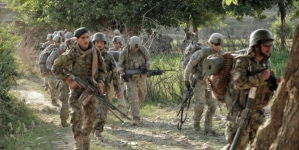-
Tips for becoming a good boxer - November 6, 2020
-
7 expert tips for making your hens night a memorable one - November 6, 2020
-
5 reasons to host your Christmas party on a cruise boat - November 6, 2020
-
What to do when you’re charged with a crime - November 6, 2020
-
Should you get one or multiple dogs? Here’s all you need to know - November 3, 2020
-
A Guide: How to Build Your Very Own Magic Mirror - February 14, 2019
-
Our Top Inspirational Baseball Stars - November 24, 2018
-
Five Tech Tools That Will Help You Turn Your Blog into a Business - November 24, 2018
-
How to Indulge on Vacation without Expanding Your Waist - November 9, 2018
-
5 Strategies for Businesses to Appeal to Today’s Increasingly Mobile-Crazed Customers - November 9, 2018
Taliban leader Mullah Omar was treated in Pakistani city?
Only two weeks ago, the Taliban released an Eid message attributed to Mullah Omar calling on Taliban fighters to back the peace talks. The message spoke in support of the peace talks with the Kabul government, adding that the objective is the “end to occupation” by foreign armed forces.
Advertisement
“The government… based on credible information, confirms that Mullah Mohammad Omar, leader of the Taliban died in April 2013 in Pakistan”, the Presidential Palace said in a statement.
He has not been seen in public since the U.S.-led invasion of Afghanistan in 2001 and is regularly rumored to have died.
Abdul Hassib Sediqi, the spokesman for Afghanistan’s National Directorate of Security, said Mullah Omar died in a hospital in the Pakistani city of Karachi in April 2013.
Emily Winterbotham, research fellow of worldwide security studies at RUSI, says that the timing of the announcement from Afghan government sources could be an attempt to hamper the peace process between the terror group and the government while the Taliban’s search for a successor could also widen divisions within the group.
Afghan officials sat down with Taliban cadres earlier this month in Murree, a tourist town in the hills north of the Pakistani capital Islamabad, for their first face-to-face talks aimed at ending the bloody insurgency.
The death of the Taliban’s supreme commander, Mullah Mohammad Omar, has been confirmed by the Afghan president’s office and the country’s intelligence agency.
The insurgents have been intensifying attacks on military and political targets, which have increased since last year’s withdrawal of most North Atlantic Treaty Organisation troops from Afghanistan. Some disgruntled Taliban factions have suggested he is dead or very ill and others may be making statements in his name.
Omar and Bin Laden were close allies, with the Saudi leader of Al-Qaeda helping to finance the Taliban’s rise to power in Afghanistan.
“The intelligence community is looking at these reports and continues to assess the circumstances around his death”, he said.
The statement was seen as significant because many Taliban have long opposed negotiating with a government it calls a Western stooge.
Omar’s death may not affect Taliban operations on the ground, but it is likely to intensify an internal tussle to replace him.
If his death is confirmed, it could complicate the peace bid amid potential succession battles within the Taliban. The Taliban, which he led, held out the promise of a pure, peaceful and corruption-free society – an appealing prospect for Afghans who had been brutalized for a decade by Soviet invaders and then a civil war.
Taliban insurgents have spread their war from the traditional southern and eastern heartlands bordering Pakistan to northern Afghanistan this year.
He had been in hiding since he allegedly conspired with Osama bin Laden on the 9/11 attacks.
Advertisement
Omar, who was Afghanistan’s de facto head of state when the Taliban was in power from 1996 to 2001, had earlier disappeared from Quetta.




























